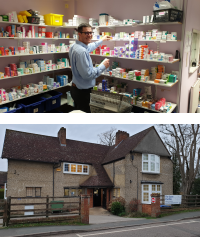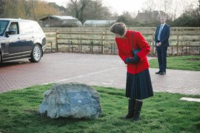T: 01822 851370 E: [email protected]
Visit RSN Survey about life in rural England to find out more.
Spotlight on the RSP - February 2020 Edition
Welcome to the February 2020 Rural Services Partnership Spotlight.
We are thrilled by the ever-increasing interest in the Rural Services Partnership (RSP) and the variety of organisations that have joined in the last year. The RSP, in partnership with the Rural Health & Care Alliance (RHCA), has increased its membership to 203 organisations!
To find out more about our existing members please click here
This month’s Spotlight showcases the diverse work being undertaken by our members to improve rural services and address vulnerability challenges in rural England.
Regional Seminar Programme
We’ve recently launched our regional seminar programme for 2020 which includes one free seminar/networking event in each region focusing on a different rural topic for members of the Rural Services Network, this includes the Rural Services Partnership. We are also featuring an RSP member at each event to share their experiences with other delegates.
- See this years plan here
- Catch up on the seminars from 2019 here
Focus on Rural Services Partnership members
We invite all members of the Rural Services Partnership to send us articles or news stories that can feature in our Rural Services partnership bulletin. If you would like to be included in our May bulletin, please forward any stories to [email protected] by 24th April.
South West Mutual
Is banking on the high street a thing of the past?
 Perhaps not! Several groups across the country are working towards forming a new network of regional community banks - working for, controlled by, and answerable to their customers.
Perhaps not! Several groups across the country are working towards forming a new network of regional community banks - working for, controlled by, and answerable to their customers.
These banks aim to serve the every-day financial needs of ordinary people, local community-based organisations and micro, small & medium sized organisations. It is their mission to help redress regional inequalities; make financial inclusion the norm; build and store community wealth; significantly increase the proportion of bank lending going to the ‘real’ regional economy instead of the financial economy; build regional economic resilience, and; bring about a renaissance of customer service, relationship-based decision making and mutual trust.
In the South West of England, one of these nascent regional banks is currently known as South West Mutual - https://southwestmutual.co.uk/. It’s head of strategy & partnerships, Darren Arulvasagam, formerly worked for South Hams & West Devon District Councils but left in 2019 to join the project team.
He said “Our bank will be solely for the people of Cornwall, Devon, Somerset and Dorset. It’s different from a credit union in that it will be full service, offering mortgages, loans, current accounts and savings accounts – but unlike banks, its sole purpose is not simply profit. Instead it will be mission-led and accountable to its members, kind of like an old-fashioned building society”.
The other key difference with these banks is that they will support personal and business customers by opening a new branch network, becoming a central resource in towns across the regions they serve. The team think accessibility to cash – both for deposit and withdrawal, is still very important and is being restricted by the reduction in bank branches & ATMs within many rural and semi-rural locations.
“Our vision is of an inclusive and sustainable society in which individuals and communities can flourish. Our purpose is to support a socially just transition to a regional economy that is inclusive and respects the natural environment, through the provision of honest, accessible, effective and locally rooted banking services.”
Several district and unitary authorities have provided support to this initiative through grant funding and may potentially invest further during subsequent funding rounds. Partnerships have been struck with housing associations and local authority homelessness prevention teams, who see the benefit of the proposed bank’s planned budgeting features and ethical lending philosophy.
Darren would like to hear from anyone who may be interested in partnering with OR helping the bank become a reality – the second investment round is about to commence.
From a market research perspective, he’s also keen to know:
- what your personal or business banking needs are;
- what vexes you or your business about your current banking provider, and;
- what you would need to see from another provider in order to entice you to switch.
Contact him at: [email protected]
Biomass Heat Works!
 Are rural areas being forgotten about in the heat decarbonisation debate?
Are rural areas being forgotten about in the heat decarbonisation debate?
Neil Holland of the Biomass Heat Works! campaign explains…
“The Government needs to, very quickly, find the most proven, sustainable and commercially-viable routes to achieving net zero targets. The decarbonisation of heat, in particular in rural and farming areas, needs a clear, effective strategy to ensure that those living, working and operating businesses in off-gas grid communities aren’t left behind their urban counterparts.
“With Government backing, investment and public support, biomass heat could play a key role moving forward, massively uplifting the rural economy and creating new jobs in farming, agriculture and forestry. Many European countries have seen huge success doing so, and as a fast-growing sector with a well-established supply chain serving mostly rural areas, the UK needs to follow suit.
“Biomass currently supports 46,000 bioenergy jobs and 700+ supply chain companies in the UK, but specifying it in future heat decarbonisation policy could also mean a rise in consumer demand from 5.5% to 15% (from 2020 to 2032*) and 100,000 jobs, predominantly in rural areas. In most cases, biomass is the lowest carbon option available to rural homes and businesses, particularly farms, therefore given current climate change issues and the need to reduce emissions, the solution already exists.
“…and that’s why the Biomass Heat Works! campaign is calling on Government ministers to identify biomass as the most fit-for-purpose solution and create a revised and extended version of the Renewable Heat Incentive (RHI) before it ends in March 2021. We’re also asking members of the UK’s rural communities far and wide, as well as domestic and non-domestic users, to get behind our campaign (sign up here www.biomassheatworks.co.uk) and push for biomass to be part of a wider rural, economic and climate change strategy given its efficiencies.
“Partnering with the Rural Services Network allows us to deliver our message to members and we hope that the majority get on board. Biomass encompasses everything from effective woodland management, sustained year-long work for agricultural contractors; farming through the summer months and increased trade during the winter (heating) season, to farm businesses being able to rival international competition with lower energy costs. By demonstrating a clear need for biomass – using low value tree parts – we have a very strong argument that would create a highly sustainable rural economy, good employment opportunities and business growth whilst contributing to carbon reduction targets.”
To support Biomass Heat Works! go to www.biomassheatworks.co.uk
Media contact: Fusion PR Creative
Sheena Griffiths on t: 01670 338395 or e: [email protected]
The Farming Community Network: Here For You
 Poor mental health is a significant issue in farming. The never-ending volatility of the industry, the threat of animal disease, the uncertainty about the future, the unpredictable weather, the long (and sometimes anti-social) working hours and the loneliness of farming all means that farmers and their family members are extremely vulnerable to poor mental wellbeing. The sad reality is that in the UK, more than one member of the farming community a week dies by suicide.
Poor mental health is a significant issue in farming. The never-ending volatility of the industry, the threat of animal disease, the uncertainty about the future, the unpredictable weather, the long (and sometimes anti-social) working hours and the loneliness of farming all means that farmers and their family members are extremely vulnerable to poor mental wellbeing. The sad reality is that in the UK, more than one member of the farming community a week dies by suicide.
When times get tough, it can be difficult for farmers to know where to turn - this is where the Farming Community Network (FCN) can help.
FCN has over 400 volunteers throughout England and Wales, who provide free, confidential, pastoral and practical support to anyone who seeks help. Most of FCN’s volunteers are involved in farming, or have close links with agriculture and therefore have a great understanding of the issues farming families regularly face.
People turn to FCN for help for a wide variety of issues, including financial problems, concerns about bovine TB and other animal diseases, family relationship breakdowns and worries about the future. But the one thing that the majority of those people have in common is that they are all experiencing some form of poor mental wellbeing. The aim of FCN is to help tackle the underlying issues that led them to their negative feelings and try and guide them to a more positive place in their life.
Whether the issue is personal or business-related, FCN’s volunteers will “walk with” those that need help and support them for as long as it takes.
It is widely anticipated that our workload will increase in the aftermath of Brexit, so we believe that we have a duty to ensure that farmers are prepared for any changes that lie ahead. We must focus on helping them build personal and business resilience.
There is some great information available to help farmers become more resilient, but this information is rarely in one place and can often be difficult to access, especially if you are dealing with reduced mental wellbeing.
This is why we have launched a brand new initiative called FarmWell.
 FarmWell is a one-stop online resources hub to help farmers and their businesses stay strong and resilient. FarmWell will give ready access to a range of vital information from a wide variety of sources. It is free to use and it has three clear aims:
FarmWell is a one-stop online resources hub to help farmers and their businesses stay strong and resilient. FarmWell will give ready access to a range of vital information from a wide variety of sources. It is free to use and it has three clear aims:
- To help develop and keep farm businesses resilient through changing times
- To help farmers, their families and their staff become resilient and enable them to manage their personal and business lives more effectively
- To provide ready access to a range of support and help to anyone who may need it
FarmWell is available to use now and is already attracting interest from a wide variety of key agricultural stakeholders, including the NFU and AHDB. To learn more about FarmWell, visit www.farmwell.org.uk.
Dispensing Doctors’ Association
 The Dispensing Doctors’ Association has published a post-election briefing paper for England outlining the value of dispensing GP practices to rural communities. Newly-elected and returned MPs have been told about the range of ‘extra’ services offered by dispensing GP practices, over and above core NHS GP services. This recognises that specialist healthcare services are often difficult or impossible to access elsewhere locally. Home visits made by rural GPs recognise that access to the surgery can be difficult for many patients.
The Dispensing Doctors’ Association has published a post-election briefing paper for England outlining the value of dispensing GP practices to rural communities. Newly-elected and returned MPs have been told about the range of ‘extra’ services offered by dispensing GP practices, over and above core NHS GP services. This recognises that specialist healthcare services are often difficult or impossible to access elsewhere locally. Home visits made by rural GPs recognise that access to the surgery can be difficult for many patients.
MPs have also been told that rural GPs are also located in the centre of local communities, which allows patients to see a GP when they need to: increasing distance from health services is known to reduce use of primary care services… resulting in higher than expected numbers of deaths and lower than expected survival [rates]. Rural GPs are also able to offer more ‘usual GP’ appointments: when patients can see the same GP more consistently there are fewer hospital admissions. Finally, rural GPs provide much-needed skilled employment and training in areas identified by DEFRA as offering fewer skilled people and less access to training and to employment.
The briefing paper, available online at https://www.dispensingdoctor.org/about-the-dda/dda-political-lobby-documents/, also includes a case study of the Swan Practice, in Buckingham, to demonstrate the benefits of the dispensing GP service
 Swan Practice serves the lovely market town of Buckingham and surrounding villages. It’s a large practice, serving 30,000 patients, spread across a wide area of beautiful countryside.
Swan Practice serves the lovely market town of Buckingham and surrounding villages. It’s a large practice, serving 30,000 patients, spread across a wide area of beautiful countryside.
The practice is the result of merging three different dispensing practices over the past few years. According to practice partner Dr Ben Burgess, the mergers were challenging, but have been worth it for patients. He says: “We are delivering improved services to patients and feel we are now in a strong position for the long-term.”
Each member practice still runs its own dispensary, in response to patient demand for local services, although each has its speciality. For example, one site specialises in making up the dossette boxes that help patients to remember to take their medicines. According to Dr Burgess, this maximises efficiencies for the practice and the NHS and reduces the risk of error.
Centralising the teams and processes has taken work, Dr Burgess admits, in order to accommodate the strengths and preferences of different members of the dispensary team, but this has now paid off.
Local employers
Collectively, the dispensaries offer employment to 14 people and the potential for career development. Six of the dispensary team members have been trained in-house, including one who started off as a delivery driver but then got the dispensary ‘bug’ and moved roles into dispensing. Others have developed new roles, for example, within a newly-established Clinical Quality Team. This is focused on enhancing patient safety and service.
Among the new team is a former dispenser who has moved into the role of clinical quality manager, a key role in overseeing purchasing and liaising with the dispensary and the clinical quality lead GP partners.
Other role developments include dispensary supervisors, dispenser-led oversight of high-risk drug monitoring and ensuring patients on problematic drugs have the necessary blood tests in a timely way. Another upskilled dispenser manages higher cost prescribing, such as stoma products and nursing homes, and also deals with the interface prescribing issues that arise due to working with a number of trusts.
Dr Burgess notes: “The dispensers have used their skills and enthusiasm to enhance their roles. We believe the new roles are keeping our patients safer and helping the clinicians to feel less pressured.”
Maximising investment in health and social care
It is Dr Burgess’ belief that dispensing income has a vital role not just for local people and patients but also in terms of the return that it offers to the NHS. Additional income generated by the dispensary supports the adoption of new technology such as electronic CD governance, which reduces costly misuse of these medicines and improves patient safety. The income also pays for quality enhancements, such as the new roles established by the practice to support and maximise the potential of NHS-funded services. These include clinical pharmacist-led medication review, and to liaise with the wider health and social care teams in hospitals and local care homes regarding prescribing issues. Dr Burgess explains: “Interface problems with other NHS and care bodies such as these are a common cause of prescribing errors nationally, and this role significantly improves safety for our patients.”
Dispensing, he says, is a win-win for the local economy as well as the NHS, providing employment and career development for local people, and the funding for technology and workforce development to maximise the Treasury's spend on health and social care in England.
Most importantly, dispensing income plays a critical role in enhancing patient care: among the services on offer the practice delivers repeat medications to 97 housebound patients. Dr Burgess says:
“Without the income from the dispensaries to subsidise the practice, we would struggle to provide the wide range of services that we can.”
Ultra low-energy Warwickshire homes bring rewards for residents
 Warwickshire Rural Housing Association (WRHA) is part of the Rural Services Partnership and is committed to providing affordable homes in rural Warwickshire for local people and families who would not otherwise be able to afford to live within their own communities.
Warwickshire Rural Housing Association (WRHA) is part of the Rural Services Partnership and is committed to providing affordable homes in rural Warwickshire for local people and families who would not otherwise be able to afford to live within their own communities.
WRHA was established in 1989 and now manages over 500 homes in 43 rural communities in the county.
Warwickshire Rural Housing Association’s (WRHA) ground-breaking development of ultra-low energy homes is now letting residents reap the rewards one year on.
In September 2018, HRH The Princess Royal officially opened Keyte Gardens, Warwickshire’s first Passivhaus development of affordable homes. The aim was to achieve space heating costs which are 70 per cent less than in standard house construction by using cutting edge technology and innovative eco features.
 WRHA worked with market-leading heat pump manufacturer, Mitsubishi Electric to provide the 14 properties with the latest renewable air source heat pumps to fuel their heating and hot water, in place of a traditional boiler. And 12 months on, the figures speak for themselves.
WRHA worked with market-leading heat pump manufacturer, Mitsubishi Electric to provide the 14 properties with the latest renewable air source heat pumps to fuel their heating and hot water, in place of a traditional boiler. And 12 months on, the figures speak for themselves.
At a time when money is tight for most people post-Christmas, Harry and Maureen Stevenson have been told that their energy payments can be substantially reduced thanks to the renewable heating technology in their two-bedroom bungalow.
“We’ve been surprised our heating bills have been so low,” says retired Maureen. “And we’ve now been told by our energy supplier that we can reduce our direct debit payments to £36 a month. When we were renting a two bedroom house previously, we were paying £69 a month, so it’s a big saving.
“The bungalow stays lovely and warm during the day and night and we turn the heating right down. We manage as we are but it definitely helps to save money as it means you can have a little holiday or something.”
WRHA used the most up-to-date renewable technology which involved siting a small air source heat pump outside each property instead of a large traditional boiler inside the property. This has helped to ensure running costs are kept to a minimum for residents, and also reduced the carbon footprint of the development as no pipelines needed to be laid to supply gas or oil to the properties.
Developed in Japan, the Ecodan QUHZ system has been designed specifically to address the heating needs of new-build homes which have good insulation and need much less heating, but still require hot water whenever the homeowner needs it.
The heat pump works by extracting heat energy from the external air and upgrading it to heat up hot water for the homes. This can then be fed through the taps inside the property or used to heat radiators for domestic heating.
In addition to the air source heat pumps, the homes at Keyte Gardens also have perfect North – South orientation for maximum solar gain during the winter months, have superior levels of insulation and air tightness, and include innovative features such as a mechanical ventilation heat recovery system to provide constant filtered fresh air and recessed and shaded tripled glazed windows to reduce overheating during the summer.
Warwickshire Rural Housing Association Company Secretary, Richard Mugglestone, commented: “Our vision was that Keyte Gardens would bring ultra low energy affordable homes to local people, helping to tackle fuel poverty and protect our climate. We are delighted that residents are now reaping the benefits of these cutting edge homes.”
Forum for Private Business
 Ian Cass, the Managing Director of the Forum of Private Business, an active member of the Rural Services Partnership has written an article about the threat that local pubs face which also highlights the ‘Protecting your pub’ guide which is due out soon.
Ian Cass, the Managing Director of the Forum of Private Business, an active member of the Rural Services Partnership has written an article about the threat that local pubs face which also highlights the ‘Protecting your pub’ guide which is due out soon.
The Threat to Rural Local Pubs
The Forum of Private Business has many pub businesses as its members, both free trade and tenant pub operators and many of these are based in rural locations. Since the inception of the Beer orders in 1989, limiting the size of a brewer’s estate and the rise of pub owning retail groups which did not brew their own beer, the shape of the UK’s hospitality industry completely changed.
We still had the smaller brewing companies with their own pub estates, who still viewed their pubs as the shop windows for their products, but we also had these huge property businesses, who’s properties happened to sell beer. In recent years these big, property owning pub companies, poor business behaviour, led to the introduction of the Pubs Code and the appointment of a pubs code adjudicator to protect the pub tenants and give them some support in dealing with their big pub owners.
4 years of inertia around the code have given these companies, which were built based on huge debts, time to restructure for sale and in the last few months the shape of the pub business has changed again, with 3 of the biggest pub owning property companies being sold off. Punch were bought by Heineken, Ei Group is being sold to the Stonegate Pub Co with roughly 2 billion pounds of debt and Greene King is being sold to the Li Ka-Shing, CKA group but again this deal carries 1.9 billion of debt along with it.
The Forum of Private businesses main concern is that the pubs are their main and only assets, so with the high debt load that the businesses carry and the difficult trading situation for many pub tenants who are forced to work on far tighter margins that their free trade counterparts, there will be a pressure to cash in on some of these assets. We feel many of these small businesses will be under threat, even if they are a perfectly viable business and we are seeing good pubs going to the wall already.
The Forum works to protect small businesses and a pub is usually a husband and wife team employing kitchen and bar staff, probably a cleaner and a few casual part time staff as well. They are also in many rural locations the centre of social activity and the key hub for these local communities.
A typical rural or semi-rural pub is not worth much as a pub, but is worth a lot more for other use, so a pub with a beer garden, bowling green and car park is a lot of land which can accommodate multiple houses, or a retirement or pre-retirement home. So, the decision to sell may not be based on commercial viability but on its location or the land it occupies, our question is how do we protect perfectly viable businesses from unscrupulous landlords?
First of all we have been working with CAMRA to produce better Information for communities, it tells them how to spot if their local pub is under threat and what they can do about it, this guide called “Protecting your pub” will be available in the New year.
We are also looking at providing better information for new and existing pub tenants, as well as seeing if we can offer these communities better protection for their local pub through changes to the planning laws.
We need to ensure that local pub businesses that are viable and a key part of the local community are protected, because once they are gone, this local resource is lost forever!
English Rural Housing
ROYAL OPENING OF AFFORDABLE RURAL HOMES IN WAREHORNE, KENT
 Warehorne, Kent - HRH The Princess Royal visited the village of Warehorne in Kent on 11th December 2019 to officially open English Rural’s new affordable housing development. Recently completed, the small development of four new homes at ‘Goldfield’ provides two houses and two flats that benefit local people. All homes have been made available at rents that are affordable to local people living, working in or with close family connections to the village.
Warehorne, Kent - HRH The Princess Royal visited the village of Warehorne in Kent on 11th December 2019 to officially open English Rural’s new affordable housing development. Recently completed, the small development of four new homes at ‘Goldfield’ provides two houses and two flats that benefit local people. All homes have been made available at rents that are affordable to local people living, working in or with close family connections to the village.
The homes are the result of a partnership with the local community, involving Warehorne Parish Council, Action with Communities in Rural Kent, Ashford Borough Council and English Rural. This is the second scheme to be built in the village by English Rural, the first being four bungalows completed 1995.
 The Princess Royal met local residents and viewed two of the affordable homes, before officially opening the development by unveiling a commemorative plaque.
The Princess Royal met local residents and viewed two of the affordable homes, before officially opening the development by unveiling a commemorative plaque.
The development secures much needed affordable homes for local people. Like many rural areas, villages across Kent have been affected by higher than average property values and lower than average wages, making it unaffordable for many local people to remain within their home communities close to family and support networks.
Planning restrictions have been agreed that will ensure the homes will always remain affordable and local people with a connection to Warehorne will always take priority as residents.
 Commenting on the visit, Martin Collett, English Rural’s Chief Executive said:
Commenting on the visit, Martin Collett, English Rural’s Chief Executive said:
“We are pleased that Her Royal Highness, The Princess Royal visited our latest development in Kent, where we are committed to working with Parish and Borough Councils. The visit will help to promote the value that small-scale affordable housing developments can bring to villages like Warehorne, providing well-designed homes in partnership with and for the benefit of the community. Affordable rural developments provide a secure and safe place for local people to live, in the communities they serve and support. This is English Rural’s second development in Warehorne – the first being nearly 25 years ago. We are always pleased when villages invite us back into their community. This not only highlights the continuing need for affordable homes but also demonstrates the trust they have in English Rural. The new affordable homes at Goldfield will play an important role in safeguarding a vibrant, active and working village that includes a mixture of age groups and income earners.
We always welcome the opportunity to work with other villages to support them with developing their own affordable homes for local people.”
After meeting local residents and viewing the homes, Her Royal Highness joined invited guests and partners involved in the project over refreshments. Afterwards, a local child presented a posy to The Princess.
Cllr Lee Small, Chairman of Warehorne Parish Council, said:
“The Parish Council was delighted to welcome HRH, The Princess Royal to Warehorne, where she saw first-hand the much-needed affordable homes at Goldfield. This local initiative where the Parish Council has worked closely with English Rural and other key partners to develop affordable homes will benefit local people and the community for years to come. Increasingly, the Parish Council is aware of the housing challenges that face many local households, with market prices being too much to afford in the village. The four new homes will help the community address this challenge.”
 Local contractor B.W. May & Son have built the homes at Goldfield which have been funded by English Rural and supported by grant contributions. The homes will be owned and managed by English Rural and can never be sold on the open market. The site is known as a ‘rural exception site’, which means development would not have normally been allowed but an exception to planning policy was made because the homes are designed to be affordable and meet local needs forever.
Local contractor B.W. May & Son have built the homes at Goldfield which have been funded by English Rural and supported by grant contributions. The homes will be owned and managed by English Rural and can never be sold on the open market. The site is known as a ‘rural exception site’, which means development would not have normally been allowed but an exception to planning policy was made because the homes are designed to be affordable and meet local needs forever.
English Rural have applied the principals of ‘Fabric First’ construction, designing the homes to be highly efficient, whilst also being attractive, spacious and comfortable. High levels of insulation have been used and Air Source Heat Pump technology provide affordable heating and hot water for residents, reducing energy use and keeping their fuel bills low.
There are a range of photos you can choose from this link:
If you use any could you credit: “English Rural / Matt Pereira Photography”
Northamptonshire Rural Housing Association (NRHA)
 Northamptonshire Rural Housing Association (NRHA) is committed to providing affordable homes in rural Northamptonshire for local people and families who would not otherwise be able to afford to live within their own communities.
Northamptonshire Rural Housing Association (NRHA) is committed to providing affordable homes in rural Northamptonshire for local people and families who would not otherwise be able to afford to live within their own communities.
Northamptonshire Rural Housing Association appoints new Chair
The new chair of Northamptonshire Rural Housing Association (NRHA) is looking forward to providing more affordable homes to enable people to stay in the rural communities they know and love.
Bradley Swingler, who has been a member of the NRHA Board since February 2016, says he will be looking to provide more affordable housing in the south of the county, as well as making a greater commitment to ensuring that new opportunities for development are sought throughout rural Northamptonshire.
“In terms of what we do as a rural housing association, our product is fantastic,” comments Bradley.
“Everyone deserves a good home and we are committed to providing affordable homes for local people and families who would not otherwise be able to afford to live in the communities where they have grown up, work or have close family ties.
“It is fair to say that, traditionally, we have struggled to find suitable sites in south Northamptonshire, and that is definitely an area where I would like us to look for viable opportunities.
“Elsewhere in the county, we have some exciting schemes in the pipeline and as the demand for rural housing is continuing to increase, it is important that we maintain the flow of new developments.”
Bradley takes over from Janet Roberts, who has retired after serving on the NRHA Board for 11 years, including three as Chair.
A Chartered Building Surveyor for commercial property consultants, Lambert Smith Hampton, based at their Northampton office, Bradley has extensive knowledge of rural housing issues.
He worked previously for South Northants Homes (SNH) Housing Association, where he worked with the Major Works Team delivering the Decent Homes Standard to its 2,900 homes.
Bradley is also currently NRHA’s representative on the Board of Midlands Rural Housing, of which NRHA is a partner.
Bradley adds: “I am delighted to be taking on the role of Chair of NRHA at such a crucial time for rural housing.
“We have a strong Board at NRHA with a good mix of public body and commercial experience, and we are in a good position financially to continue to work with local authorities, parish councils, community groups, landowners, planners, funders and housing associations to identify and progress dozens of rural housing schemes at varying stages.
“NRHA has worked in Northamptonshire for over 20 years now. Our homes are very much part of the villages and market towns we serve and we are proud to continue to help people in rural Northamptonshire have a place to call their home.”
Dates for your diary
As RSP members you have more opportunities than ever to network and learn from best practice, as we continue to provide a diverse and exciting programme of events. These include:
DATE |
MEETING/EVENT |
LOCATION |
SUBJECTS COVERED |
| 24/02/2020 | *Regional Seminar Programme | West Midlands Regional Seminar | Rural Health & Wellbeing |
| 09/03/2020 | *Regional Seminar Programme | South East Regional Seminar | Rural Economy |
| 23/03/2020 | *Regional Seminar Programme | South West Regional Seminar | Time for a rural strategy |
| 06/04/2020 | Rural Health & Social Care Sub Group (AM) | LGA, London | |
| Rural Assembly Meeting (PM) | LGA, London | ||
| 20/04/2020 | Rural Services Vulnerability Group Meeting (AM) | (TBC) | |
| Rural Services Partner Group (PM) | (TBC) | ||
| 11/05/2020 | *Regional Seminar Programme | North East Regional Seminar | Barriers to Access – Rural Transport & Connectivity |
| 22/05/2020 | Rural Economy Sub Group (PM) | LGA, London | |
| 27/07/2020 | *Regional Seminar Programme | East Midlands Regional Seminar | Rural Skills & Education |
| 08/09/2019 | RSN Rural Conference | Park Campus, Cheltenham | (TBC) |
| 09/09/2019 | |||
| 05/10/2020 | *Regional Seminar Programme | North West Regional Seminar | Rural Vulnerability |
| 02/11/2020 | *Regional Seminar Programme | Yorkshire Regional Seminar | Rural Housing |
| 16/11/2020 | Rural Health & Social Care Sub Group (AM) | LGA, London | |
| RSN AGM (PM) | LGA, London | ||
| Rural Assembly Meeting (PM) | LGA, London | ||
| RSP LTD (PM) | LGA, London | ||
| 23/11/2020 | Rural Services Vulnerability Group Meeting (AM) | (TBC) | |
| Rural Services Partner Group (PM) | (TBC) |
*The regional seminar programme for 2020 can be downloaded here
Promoting Rural Best Practice
 Many of our members are keen to tell you more about their organisation’s excellent work and with this in mind we have developed a unique area on our website as a resource for them to do so. This can be found here.
Many of our members are keen to tell you more about their organisation’s excellent work and with this in mind we have developed a unique area on our website as a resource for them to do so. This can be found here.
Equally, the RSP are keen to provide opportunities for RSP members to promote their work to the wider RSN network of 25,000, which includes 127 LAs, community organisations, rural businesses, and parish councils, to mention but a few. Members can send through this information by emailing [email protected].
Why Not Join Up!The RSP exists to enable the issues facing the rural areas of England to be identified, information and good practice to be shared and government to be challenged to address the needs and build on the opportunities which abound in rural areas. If you know a rural organisation that would benefit from membership, please ask them to consider joining us. The RSP is a solely rural focused organisation with an electronic distribution network in excess of 25,000 individuals. We reach all sectors of rural England and provide a sustained and respected voice for rural areas at national level. Anyone who wants to talk to us about our role and services of the RSP please take a look at the link https://www.rsnonline.org.uk/page/about-the-rsp or contact [email protected] to find out more. |




